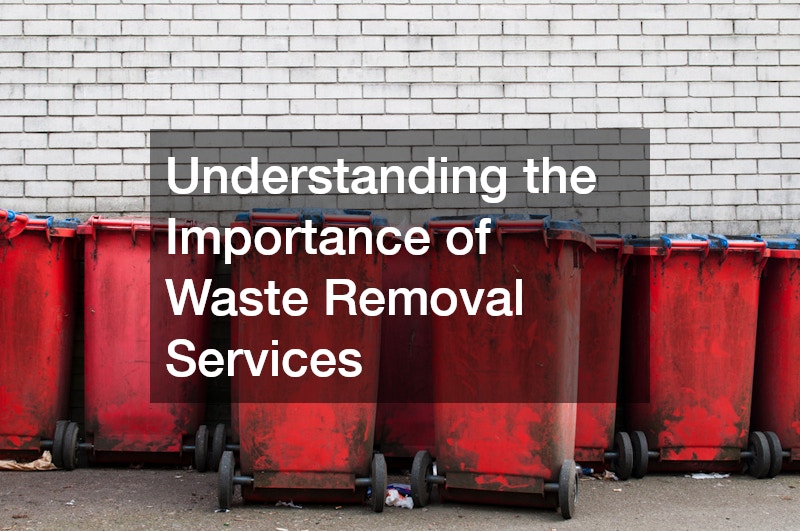In today’s world, waste management is a critical component that influences environmental sustainability and public health. Waste removal services play a crucial role in ensuring that waste is handled appropriately. This article explores the necessity and impact of efficient waste removal services in modern society.
Why Are Waste Removal Services Important?
The management and removal of waste are essential in preventing health hazards and ensuring a clean and safe environment for communities. Unmanaged waste can lead to the spread of infectious diseases, attracting pests and vermin that pose risks to human health. Effective waste removal prevents contamination of natural resources like water supplies, which is integral for public safety.
In urban areas, waste removal mitigates harmful effects, such as polluted air and waterways, which can directly impact human health. By removing waste efficiently, communities reduce the risk of chemical exposure and respiratory problems caused by decaying refuse. Additionally, clean environments contribute to overall well-being and improve the quality of life for residents.
In many developing countries, inadequate waste management systems are directly linked to rising health issues and decreased life expectancy. This highlights the importance of investing in waste removal infrastructure to ensure public health and safety. Waste removal services are therefore foundational to maintaining not just cleanliness, but also the overall health of populations.
Proper waste removal services help in minimizing the negative impact on the environment by ensuring waste disposal and recycling efficiency. By diverting waste from landfills to recycling centers, these services reduce the strain on landfill sites and lower greenhouse gas emissions. Effective waste removal can curb practices that lead to soil degradation and water pollution.
Many cities are now adopting zero-waste policies, promoted by efficient waste removal practices that prioritize sustainability. Waste removal services work to reduce the ecological footprint by converting waste into energy and recovering raw materials. Such practices not only conserve natural resources but also promote a circular economy, where materials are reused, thus extending their lifecycle.
Ensuring that hazardous waste is properly managed is crucial for environmental protection. These services prevent the leaching of harmful substances into ecosystems, which can disrupt wildlife and natural habitats. The environmental benefits of waste removal are far-reaching, influencing not just local areas but contributing to global environmental preservation efforts.
How Do Waste Removal Services Work?
The process begins with the collection of waste from households, businesses, and industrial sites, followed by its transportation to disposal or recycling centers. Waste collection systems must be efficient and flexible to accommodate varying waste volumes and types. Efficient transportation networks ensure that waste is promptly and safely delivered to appropriate facilities.
Logistical planning is crucial in managing waste collection routes to minimize fuel use and reduce emissions. Many waste removal services now employ technologies like GPS and route optimization to improve efficiency. This not only enhances service delivery but also contributes to lower operational costs.
By prioritizing streamlined collection and transportation, waste removal services can manage waste more sustainably. Properly managed transport reduces the carbon footprint associated with waste management. Effective logistics are central to the overall success and sustainability of waste removal operations.
After collection, the waste undergoes various treatment processes to ensure safe disposal or conversion into reusable materials. Treatment processes might involve incineration, composting, or chemical treatment to neutralize hazardous components. Choosing the appropriate disposal method is crucial to minimize environmental impact and optimize resource recovery.
Advancements in waste treatment technologies have enabled more efficient processing and higher recovery of resources. Waste-to-energy processes, for example, convert non-recyclable waste into electricity or heat, providing a renewable energy source. This approach not only reduces landfill dependency but also contributes to sustainable energy production.
Efficiency in treatment and disposal is essential for addressing the challenges of managing hazardous and non-hazardous waste. Proper disposal ensures compliance with environmental regulations and reduces the risk of contamination. Investment in modern treatment facilities equips waste removal services to handle increasing waste volumes effectively.
What Are the Challenges Facing Waste Removal Services?
The growing global population and consumerism lead to increasing volumes of waste, putting pressure on existing waste removal infrastructures. Urbanization is exacerbating waste management challenges, particularly in developing regions with limited resources. Efficient strategies and infrastructure upgrades are necessary to manage escalating waste effectively.
The rise in e-waste due to advancing technology poses new challenges for waste removal services. Specialized facilities are required to handle and process electronic waste safely. Without proper management, this type of waste can release toxic substances, threatening human health and the environment.
A proactive approach in modernizing waste removal infrastructure is crucial to accommodate future waste demands. Integrated systems that can handle diverse waste types and large volumes will play a vital role in this effort. Collaboration between governments, industries, and communities is essential to stay ahead of increasing waste challenges.
Poor waste segregation practices can hinder the efficiency of waste management systems and lead to environmental issues. Without proper segregation at the source, recyclable and non-recyclable wastes are mixed, complicating downstream processes. Educating communities and businesses on effective waste segregation can significantly improve overall system efficiency.
Mismanagement results in increased contamination of recyclable materials, reducing the economic viability of recycling initiatives. Investment in innovative sorting technologies can enhance the ability to separate and recycle waste materials efficiently. Addressing these issues requires government policies and initiatives that promote best practices in waste segregation.
Policy frameworks can encourage individuals and businesses to adopt better segregation practices through incentives or penalties. Implementing source-segregation programs can help ensure a cleaner waste stream for recycling and recovery processes. Reducing mismanagement in waste separation plays a crucial role in achieving waste management goals.
Waste removal services are vital in maintaining environmental health, public safety, and economic efficiency. Despite the challenges, investing in improved waste management practices and infrastructure is essential for sustainable development and the well-being of future generations. Continued efforts in modernization and policy compliance will ensure the effective management of waste, supporting environmental resilience and human health.


